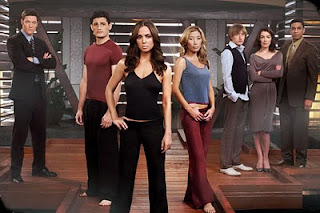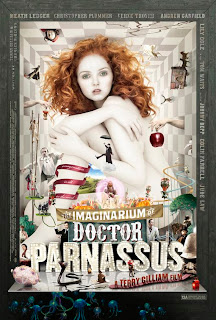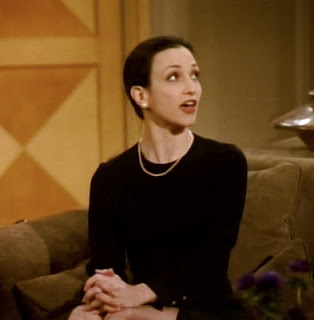
So, to the sadness of some and the outright joy of others, the series DOLLHOUSE came to an end this Friday. Joss Whedon’s latest was a polarizing beast, to put it mildly, and while some of the issue seems to be that the geek favorite was due for a backlash, it was also a weird and uneven show. It was the mutant product of a deal between Fox and star Eliza Dushku that produced a show that would not have been greenlit otherwise, on a network that the showrunner had previously been badly burned by. Its cancellation was anticipated well before it aired, and its survival to a second (albeit brief) season was received with shock. On top of it all, there’s a whole host of gender politics and sexual issues invoked by the subject matter, which leads to fun times and accusations for all.
But what about the show itself? Well, I liked it. I liked LADY IN THE WATER too, so take anything I say with enough salt to kill a man, but I feel weirdly compelled to speak about what I think made this show worth watching. The premise was creepy, the tone jumped from 80s action series to cyberpunk mindfuck and back and forth without much warning, and arguably Ms. Dushku was in over her head, but just about every time the series seemed on the verge of total breakdown, something came along and prodded it back into engaging weirdness. I’m not sure what kind of piece I’m writing here, it’s got the bones of a review but there are various extratextual thingies I want to get into as well, but if you bear with me just a moment I’m sure we’ll have this sorted by the end.
So, the Dollhouse is a project put together by the Rossum corporation, home to all sorts of brain-breaking technology. Clients pay exorbitant amounts of money for the service of one of their “actives”, people programmed with a specific personality for the situation at hand. Many use it for a high class, highly specific brothel, others use it to hire bodyguards, negotiators, midwives (though that’s a weird story), surrogates for dead loved ones, etc. Dushku plays Echo, the most popular active, who has a habit of retaining bits of memories and skills from every imprinted personality she’s ever had, as well as flashes of her original self, who’s stored away on a hard drive as part of a contract signed when she needed to disappear for a few years.
The first few episodes in both seasons focused on individual jobs Echo took on, a “bottle show” approach that seemed to backfire on the show pretty quickly. On the one hand, it’s the obvious approach- the gimmick of the show is that the protagonist can become anyone, do anything, so throw them into some standard action show situations and have fun. Honestly, I did not hate these kinds of episodes, for the most part. I even have a soft spot for “Stage Fright”, the admittedly goofy as Hell installment in which Echo becomes a bodyguard for a pop star whose life has been threatened. It hit a weird nostalgia that I don’t even have for shows I never even watched, shows like KNIGHT RIDER and CHARLIE’S ANGELS where the point was to see which basic story concept got picked out of the pile each week (“Angels, I need you to go undercover... at Las Vegas' newest casino resort!”) I dunno. The basic problem was, Echo is usually tabula rasa without a specific personality, so there’s no character to get attached to, and while the second season established more of a baseline personality for her based on her accumulation of imprints, the bottle shows felt more like an anthology than anything else. And anthologies have not played well on TV for a while.
(As a side note, it’s worth investigating why that is. Seriously, we used to have THE TWILIGHT ZONE and PLAYHOUSE 90 and ALFRED HITCHCOCK PRESENTS but now every show has to have continuing characters and an ongoing storyline. What happened there? Changing the subject, sorry.)
In any case, the bottle shows did start to feel rather uninspired, and eventually the show got around to the more popular (critically, at least- commercially the show was dead in the water more or less the whole time) approach of episodes focused on the machinations of the Dollhouse itself. From the start you had the subplot of a former FBI man named Ballard (Tahmoh Penikett) obsessed with revealing this clandestine operation, and with Caroline, Echo’s original self, who apparently found out way too much about Rossum. And of course, the technology to reprogram people can be used for a lot more than just prostitution and temp jobs, and it’s suggested that the Dollhouse is basically a moneymaking machine and R&D house used in support of whatever Rossum really has planned.
This raises some very weird issues. In theory, all the actives have joined the program by choice. They serve 5 years or so on a contract, and are released back into their normal selves with a ton of money and whatever unpleasantness drove them there erased somehow. Clean criminal records, selective memory wiping to remove traumas, that sort of thing. But even if you were to overlook the coercion involved in getting some of the actives hired, the question is whether or not you can pre-emptively consent to indentured servitude, without any way of backing out in the middle if you change your mind. (In fact, since your mind is on ice, you can’t change it.)
So it’s uncomfortable, and that the show did not immediately come out and say that this was bad, bad, bad made some people argue that it was a glamourized prostitution fantasy. Not that the Dollhouse was ever unambiguously positive either- rather, its manager, Adelle DeWitt (Olivia Williams), about whom I will say more later, was a morally conflicted figure trying to justify the sleazier engagements by balancing it out with pro bono work.
Now, there’s a lot of additional stuff that comes up here, regarding Joss Whedon’s own reputation as either a feminist or not-really-a-feminist and whether sights like Eliza Dushku in bondage gear have any place in “feminist” work for whatever definition that has, and it’s all very inflammatory and impossible to discuss because it’s more polarized than a pair of 3-D glasses, and so on. I’m tempted to dismiss this with the old David Cronenberg adage of “an artist has no social responsibility whatsoever”, which may seem like an extreme statement but did you ever make VIDEODROME, but in this case I think it may be enough to say that the subtle wrongness of everything fit the material quite well. The Dollhouse has a pleasant veneer; it’s the appealing face of a company out to control your mind, after all. Every character is dealing with difficult and morally uncertain situations, so it makes sense that we’re made a little uncomfortable alongside them. And if it’s problematic, well, so’s any work worth discussing.
Cronenberg seems like an appropriate authority to appeal to here, because DOLLHOUSE evokes a lot of the themes and concepts that he’s dealt with as a filmmaker. You’ve got identity and transformation thereof, massive corporate conspiracies, sex and violence, and as we just talked about, moral ambiguity up the wazoo. I’m not sure if Whedon was specifically influenced by anything Cronenberg did, but I would wager money that at the very least he’s drawing on Philip K. Dick.
Of course, similarities aside, the show does trade a bit more on moral certainty in the end; the unaired DVD-exclusive episode “Epitaph One” (the result of some weirdness between Fox and the show over how many episodes were ordered) reveals that the Dollhouse tech is ultimately responsible for bringing about the end of civilization as we know it, Adelle’s attempts to keep her Dollhouse ethical put her at odds with Rossum, and the emotional toll all this takes on the characters is not ignored.
Still, the discomforting nature of the show was probably what, more than anything, doomed it commercially. The success of Whedon’s BUFFY THE VAMPIRE SLAYER (and most other genre shows) was partly due to fans’ identification and empathy for its main characters. He could and did put them through the emotional wringer, but there was still a certain safety in their friendships and our knowledge of them as fundamentally good people. While FIREFLY was a commercial failure, I’d argue that the reason it has such a fiercely devoted fanbase is because the crew it created is so damn likable, and even the ship itself took on a certain “safe haven” quality, even when invaded by bounty hunters and the like.
DOLLHOUSE doesn’t really offer that- every character is morally compromised on some level, the place’s Zen garden quality is a mask for the ugliness of what gets done, and even if this show had gotten good numbers, dark intense conspiracy thrillers really only work for a few years before they inevitably lose focus. (David Duchovny, early in the run of THE X-FILES, said it shouldn’t run for more than five seasons. He may have been right.) Heck, even BATTLESTAR GALACTICA had more of a comfort zone.
Eliza Dushku took a bit of criticism for her work as the lead. It’s funny- I remember that when she was on BUFFY, people liked her performance a lot, but she is apparently now a terrible actress who couldn’t carry an infomercial let alone a series. (This kind of hyperbole is intrinsic to fandom- I have pretty much heard the same about every DOCTOR WHO companion, everyone on TORCHWOOD, every Bond Girl since I started paying attention to Bond movies, etc.) Now, I do think she’s limited, and in the first aired episode there are a couple of very obvious, very stagey moments where she doesn’t quite convince. But if she got pushed out of her zone now and again, I think she held up most of the time. The overall ensemble fares better; in particular, Enver Gjokaj, playing the active Victor, steals the show on several occasions, and someone needs to cast him in something now because he is awesome.
And as long as this is getting, I want to talk about one more thing.
Adelle. Fucking. De Witt.

In retrospect I could just mention her and that would be all the defense this show needs. She is arguably one of the very best characters that Joss Whedon has created. Indeed, for those who say that he doesn’t *really* write strong women, well, there’s Adelle. True, she’s got issues. She’s got trade paperbacks. She is conflicted from the start, the pleasant face of the Dollhouse, the ruthless protector of it, and the jailer of a whole alphabet’s worth of men and women. But her moral journey is the show’s most compelling arc, and Olivia Williams plays it superbly. What I said about the show not having the most identifiable ensemble is true, but Adelle- I love Adelle.
Also, whoever is responsible for the character’s fashion needs, if not an Emmy, some sort of medal for distinguished service. I normally don’t notice these things, and Williams would look good wearing a potato sack, but not only is Adelle reliably fabulous, her wardrobe and hair reflect character and mood in the most wonderful way. Whether it’s the gentle look when she’s setting up deals with clients, or a black power suit when the gloves are off, she’s like a mature, morally conflicted Emma Peel.
The whole thing ended on an understandably rushed but still satisfying apocalyptic cyberpunk bash-up, which brought the characters’ various arcs to mostly satisfying conclusions. When the show was renewed for a second season, I took it as a gift, and apparently the showrunners did as well, and we got to have closure. The whole thing was a freak, a mutant that got away from Fox, Whedon, and everyone else and did some neat stuff in its short time. It won’t go down as a classic, but it’s one of the most idiosyncratic things I’ve seen on network TV in a while, and that should guarantee it a minor place in history.
In other words, Grade: B+.






